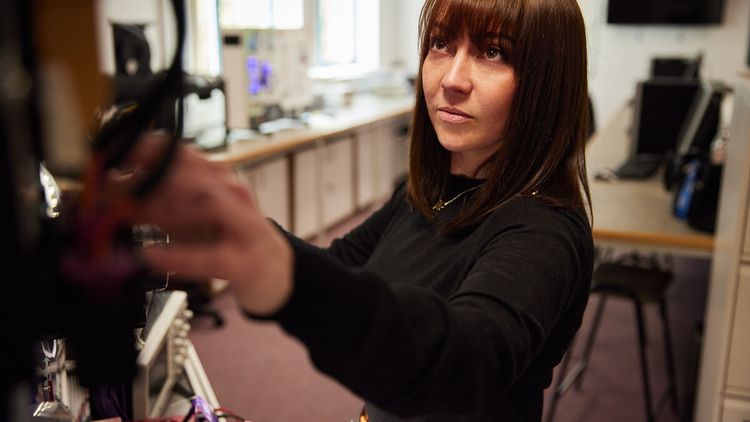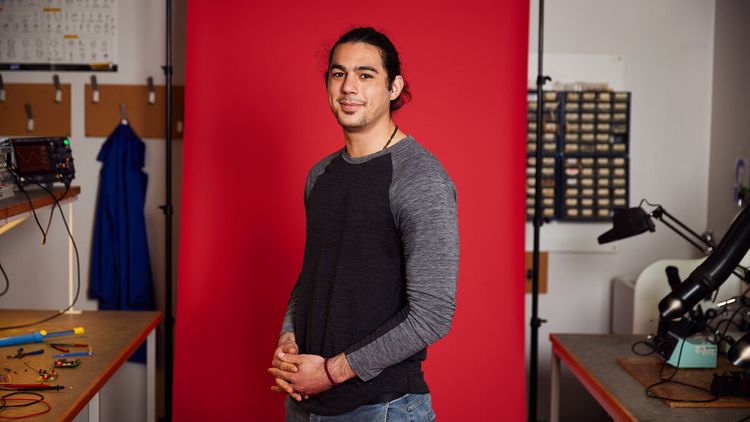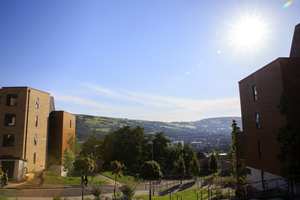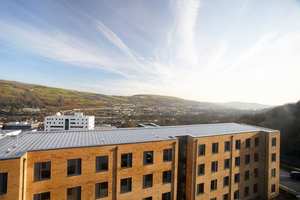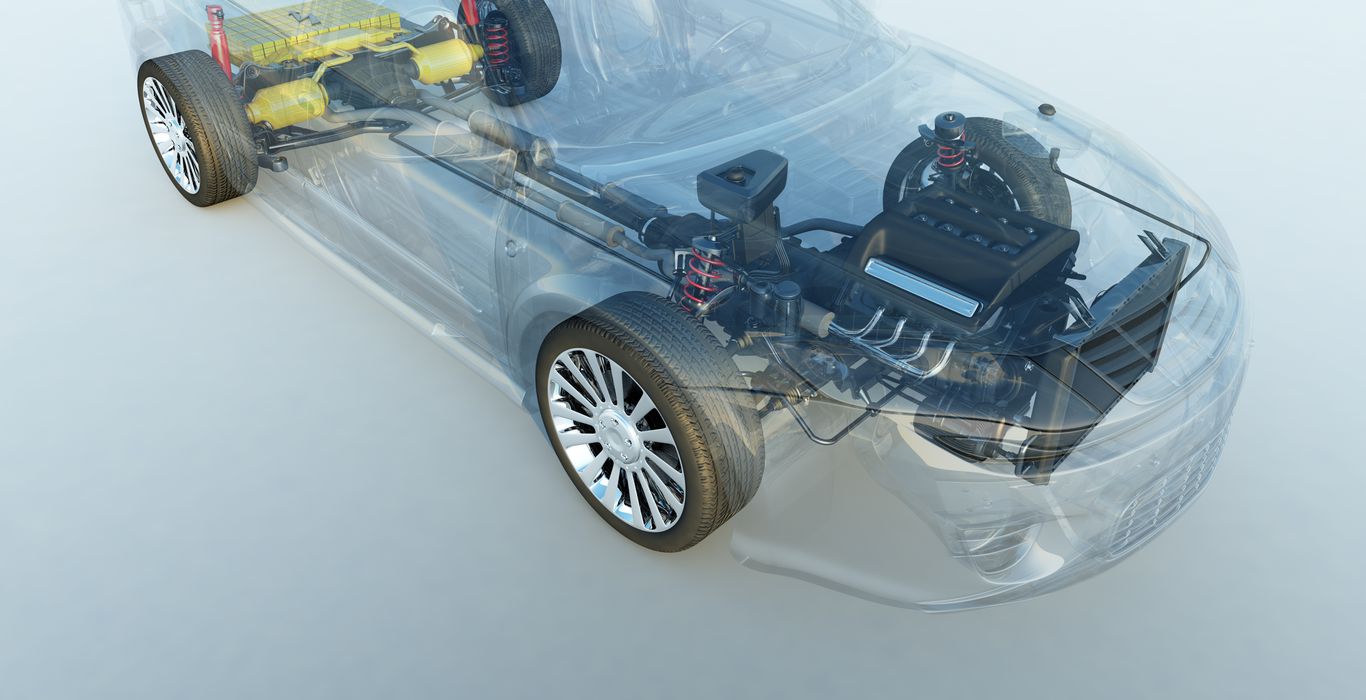
BEng (Hons) Automotive Engineering
The BEng (Hons) Automotive Engineering degree will provide you with the knowledge and skills required in the modern automotive industry, with a focus on autonomous vehicle technology.
The automotive industry is changing rapidly and moving towards electrical vehicles which are set to completely dominate the market in the next two decades. This course has been designed with these technological developments in mind with as much emphasis on electrical side of vehicle design as the mechanical side so graduates are well equipped for the automotive industry of the future.
Designed to meet the accreditation requirements of the IET for Chartered Engineer status, the course includes elements of mathematical and physical sciences required to design, develop and manufacture a range of engineering systems.
You will study the elements of electrical engineering, such as power and control, crucial for analysing and designing electromechanical drive systems. Programming smart embedded systems will also be covered so that you are ready for the fast development in autonomous and driverless cars.
In the first year you will sit modules that are all common between electrical and mechanical engineering students. This is to ensure all underlying pre-request knowledge for modern automotive engineering is covered. Finally, you study elements of management, business and professional practice. This will develop your initiative, and effective communication and interpersonal skills, to achieve the high level of technical leadership required in a modern engineering environment. Your new skills will be further tested through group and individual research and design projects.
Year One: Automotive Engineering degree
- Mathematics for Engineers
- Design and Manufacture
- Electrical Principles
- Introduction to C programming and Embedded Systems
- Engineering Applications
- Thermofluids for Engineers
Year Two: Automotive Engineering degree
- Configuration and Programming of Embedded Systems
- Power, Machines, and Control
- Group Project and Management for Engineers
- Engineering Material Science
- Design for Automotive Engineers
- Energy Storage Technology
Year Three: Automotive Engineering degree
- Hybrid / Electric Vehicle Technology
- Power Systems
- Vehicle Dynamics and Structure
- Autonomous Vehicle Technology
- Individual Project
Teaching
The Automotive Engineering programme taps into the renowned expertise of the Centre for Automotive & Power System Engineering (CAPSE), a nationally recognised research, development, test and certification centre at the University of South Wales, with a reputation for cutting edge research within the advanced automotive and power systems engineering sectors. The course will also build on the University’s strong links with Formula Student.
We have strong links with industry and place considerable emphasis on student projects. We also encourage industrial placements as part of a sandwich year option.
You can study this degree as a three-year, full-time course or over four years to include a sandwich work placement.
Typical contact hours for a 20 credit module are 48 hours lectures per module (two hours a week) plus 24 hours of labs (one hour a week). Students are typically expected to spend about 72 hours independent study per 20 credit module per year.
This engineering programme is taught through lectures, which are supported by tutorials, practical sessions and seminar groups. Wherever possible, your work will be based on live projects and case studies, with contributions from industry professionals.
Throughout your training, you will engage in activities, such as practicals, individual and group projects, that help you become self-reliant, self-motivated and resourceful, as well as develop leadership qualities and management expertise.
Assessment
There is a range of assessment methods. The first two years of this engineering degree combine exams and assessments based on laboratory work, but in later years there are exams for technical options and coursework or reports for management and project work.
Accreditations
This course is currently pending IET accreditation. This would confer partial requirement for Chartered Engineering (CEng) status. This means that what you learn meets industry standards, so you will graduate with the engineering ability and managerial business skills to succeed.
Placements
Our students are encouraged to spend a year working in industry. This year will give you firsthand experience of working in the sector.
Facilities
Our engineering facilities are excellent. They include: composite making facilities, additive manufacturing facilities, laser scanner, aluminium casting facility, a wind tunnel, material testing facilities, non-destructive facilities as well as laboratories with equipment for supplementing teaching in mechanics, dynamics, thermodynamics, fluid-dynamics and control.
We also have a well-equipped Formula Student build area. Our electronics labs feature industry-standard facilities help you make the transition from the classroom into an employment setting.
Lecturers
We regularly revalidate courses for quality assurance and enhancement
At USW, we regularly review our courses in response to changing patterns of employment and skills demand to ensure we offer learning designed to reflect today’s student needs and tomorrow’s employer demands.
If during a review process course content is significantly changed, we’ll write to inform you and talk you through the changes for the coming year. But whatever the outcome, we aim to equip our students with the skillset and the mindset to succeed whatever tomorrow may bring. Your future, future-proofed.
Contextual offers
We may make you a lower offer based on a range of factors, including your background (where you live and the school or college that you attended for example), your experiences and individual circumstances (as a care leaver, for example). This is referred to as a contextual offer and we receive data from UCAS to support us in making these decisions. USW prides itself on its student experience and we support our students to achieve their goals and become a successful graduate. This approach helps us to support students who have the potential to succeed and who may have faced barriers that make it more difficult to access university. Here is a link to our Contextual Admissions Policy.
Other qualifications and experience
We can also consider combinations of qualifications and other qualifications not listed here may also be acceptable. We can sometimes consider credits achieved at other universities and your work/life experience through an assessment of prior learning. This may be for year one entry, or advanced entry to year two or three of a course where this is possible.
To find out which qualifications have tariff points, please refer to the UCAS tariff calculator.
If you need more help or information or would like to speak to our friendly admissions team, please contact us here
Typical A-Level Offer
BBB to include Mathematics and a numerate subject such as Physics, Chemistry, Biology or Geography.
Typical Welsh BACC Offer
Pass the Advanced Welsh Baccalaureate Diploma with Grade B in the Skills Challenge Certificate and BB at A Level to include Mathematics and a numerate subject such as Physics, Chemistry, Biology, Geography (this is equivalent to 120 UCAS tariff points).
Typical BTEC Offer
BTEC Extended Diploma Distinction Distinction Merit in a relevant subject which must include Maths and Engineering or Science modules (this is equivalent to 120 UCAS tariff points).
Typical Access to HE Offer
Pass Access to HE Diploma in Maths/Science with a minimum of 120 UCAS Tariff points
Full-time fees are per year. Part-time fees are per 20 credits. Once enrolled, the fee will remain at the same rate throughout the duration of your study on this course.
August 2024 - July 2025 Fees
Full-time UK: £9000
Full-time International: £15260
August 2025 - July 2026 Fees
Full-time UK: TBC
Full-time International: TBC
Student Perks
At the University of South Wales, you’re investing in so much more than a degree. We strive to provide our students with the best possible experience, no matter what you chose to study. Whether it’s access to top of the range mac books and PCs, state-of-the-art facilities packed with industry-leading equipment and software, masterclasses and events led by industry experts, or a wide range of clubs and societies to meet likeminded people, better tomorrows start with extra perks.
Each course also has their own unique student benefits to prepare you for the real word, and details of these can be found on our course pages. From global field trips, integrated work experience and free course-related resources, to funded initiatives, projects working with real employers, and opportunities for extra qualifications and accreditations - at USW your future, is future-proofed.
Click here to learn more about student perks at USW.
Additional Costs
As a student of USW, you’ll have access to lots of free resources to support your study and learning, such as textbooks, publications, online journals, laptops, and plenty of remote-access resources. Whilst in most cases these resources are more than sufficient in supporting you with completing your course, additional costs, both obligatory and optional, may be required or requested for the likes of travel, memberships, experience days, stationery, printing, or equipment.
Funding
Funding to help pay for (or cover) course tuition fees and living costs
Whilst you’re studying, you’ll have two main financial obligations – tuition fees and living costs. There’s lots of financial help available from the University of South Wales and external funding sources, that may provide loans (which have to be paid back) and grants, scholarships and bursaries (that don't).
To learn about course fees, funding options, and to see if you are eligible for financial support, visit our Fees and Funding pages.
Faculty of Computing, Engineering and Science Travel Bursary
The Faculty of Computing, Engineering and Science offers a travel bursary of £500 which is available to all students undertaking an undergraduate sandwich degree. Find out more.
UK students
Apply via UCAS if you are a UK residing applicant, applying for year one of a full-time undergraduate degree, Foundation Year, Foundation Degree or HND and you have not applied through UCAS before. If you are applying to study part-time, to top up your Foundation Degree or HND, or to transfer to USW from another institution, please apply directly.
International and EU students
Apply directly to the University if you live outside the UK.
Graduates from the Automotive Engineering degree can take on the role of:
- Automotive design engineer
- Reliability and asset management engineering
- Automotive production engineering
- Car production engineer
- Product manager (with experience)
- R&D engineer
Our Careers and Employability Service
As a USW student, you will have access to advice from the Careers and Employability Service throughout your studies and after you graduate.
This includes: one-to-one appointments from faculty based Career Advisers, in person, over the phone or even on Skype and through email via the "Ask a Question" service. We also have extensive online resources for help with considering your career options and presenting yourself well to employers. Resources include psychometric tests, career assessments, a CV builder, interview simulator and application help. Our employer database has over 2,000 registered employers targeting USW students, you can receive weekly email alerts for jobs.
Our Careers service has dedicated teams: A central work experience team to help you find relevant placements; an employability development team which includes an employability programme called Grad Edge; and an Enterprise team focused on new business ideas and entrepreneurship.


